What are Watercolor Pencils: Ideas, Techniques, and FAQs
Last Updated: October 28, 2025
Are you a coloring enthusiast who has recently discovered the beauty and versatility of watercolor pencils? Do you want to learn how to use watercolor pencils and get some watercolor pencil ideas for beginners? Whether you’re a beginner or experienced in watercoloring, this 5-minute read will help you figure out if these handy watercoloring tools are for you!

A Brief History of Watercolors
With its rich history dating back to more than 700 years ago, watercolors have significantly influenced the world of arts and crafts. Watercolor paint is a versatile coloring medium that artists enjoy using because it allows them to use a variety of techniques and produces excellent results. Watercolors are water-soluble paints that are notable for their translucency. This is why watercolor art is known for having light and flowy effects. Before the advent of watercolors, artists only either painted or drew. Watercolor art gave birth to a new art form that is between painting and drawing, making it the best of both worlds. However, watercoloring was often regarded as the “unforgiving art,” and an artist needed to apply lines, colors, and shapes correctly on their first attempt, or the desired effect will get muddied. This has changed over time, with more and more beginners and hobbyists choosing to get creative with watercolors.

Simple Roses Stamp & Die Bundle
What Is Watercoloring?
Watercoloring is a painting method that uses watercolors as its primary paint medium. Using different techniques and different painting mediums will help you achieve different results. As time went by, the methods and types of watercolors have drastically evolved. There are several watercoloring options readily available for both experienced artists and newbies. Back then, artists were restricted to watercolor pans and tubes. Nowadays, there are watercolor pencils, watercolor pens, watercolor brush markers, and more. Not only can these make watercolor painting more accessible and more convenient, but they can also offer a wide range of stunning effects and incredible results.

Woodless Watercolor Pencil 24 Set
What Are Watercolor Pencils?
As the name suggests, this is a type of watercolor in the form of a pencil. This watercoloring medium perfectly combines drawing and painting, making it a favorite among artists and coloring enthusiasts. Its versatility and the variety of results make it more appealing than other coloring mediums. Most beginners who are still testing the waters and experimenting with various color combinations find these pencils extremely useful. It’s relatively easier to play around with some unique color combinations using these. These pencils can either be used dry (like a colored pencil) or wet (like watercolors). Activating it with water will give it the look and feel of watercolors.
If you’re wondering how to use watercolor pencils, it’s actually pretty easy. Here’s how:
- Pick a color and start using it as you would a colored pencil.
- Once you’re happy with your coloring, activate the pigment by adding water to it. You can do this with a wet paintbrush or by dipping your pencil in water.
- You can intensify the colors, add more colors through layering, or mix it with other colors. It’s up to you!
The video above will give you a few ideas on watercolor pencil art for beginners, as well as a comparison between watercolor pan, pencils, and brush markers.
What is the difference between watercolor pencils and colored pencils?
Although they may appear similar, these two types of coloring mediums are as different as night and day. Unlike traditional colored pencils, watercolor pencils use a different binder. A binder is what holds the pigment together and allows it to be spread over a surface. Whereas colored pencils usually have an oil-based or wax-based binder that is non-reactive to water, watercolor pencils have a water-soluble binder. This makes the latter reactive to water, hence, letting it behave like watercolor.

Woodless Watercolor Pencil 24 Set
Still curious about these fantastic coloring tools? We’ve answered some of the most commonly asked questions on how to use watercolor pencils!
Dipping these pencils in water is one way to activate them. This, however, will produce a different effect - a more intense and bolder color. You can easily blend this with a paintbrush or a pencil.
When you start using these pencils, you will find a ton of watercolor pencil techniques online. One of the most basic techniques for beginners is mixing colors. If you’re familiar with watercolor pigments, then this won’t be a challenge for you. Remember, these pencils are actually watercolors, just in a different shape and form. You can mix watercolor pencils in the same way that you would mix watercolor pigments in pans or tubes - with the help of a watercolor brush or a paintbrush.

Read: How To Get A No-Line Look With Watercolor Pencils- Lydia’s Crafty Corner
While most artists would opt for a paintbrush when using watercolors, a watercolor brush or water brush is also a great option. A water brush is a type of brush that can be filled with water. Altenew’s watercolor brush has a durable nylon tip and a refillable reservoir in the handle that can hold up to 7 ml of water. You can use water brushes the same way that you would a paintbrush. The only difference is, you just need to fill it with water instead of dipping the brush tip in water.
Just like in every artwork, using high-quality and durable paper is essential. You cannot create stunning watercolor art with regular printer paper. Even if you manage to create one, it probably won’t last long until it wrinkles and warps. While most experienced and professional artists would go for 100% cotton paper that is fully archival, a decent and quality cold press watercolor paper will also do the trick.
Watercolor papers are thick specialty papers that are more absorbent of water, making them more resistant to warping, unlike traditional or regular paper. Cold press paper is more popular because of its slight texture or ‘tooth.’ Some artists may also prefer hot press watercolor paper, which is smoother and doesn’t absorb color as quickly as cold press.
The versatility of watercolor pencils makes them the perfect choice for both wet and dry techniques. If you are looking for easy watercolor pencil drawings, you can give this a try! You can definitely use these pencils just like a regular pencil or a colored pencil. Use it to draw or sketch your design and leave it as is. You don’t need to activate it with water and use it like watercolors.

Sunflower Outline Stamp Set & Woodless Watercolor Pencils Bundle
Watercolor Pencil Techniques
With the increasing popularity of watercolor pencil art for beginners, it’s not that hard to find inspiration online. Pinterest is a wonderful option if you need easy watercolor pencil drawings and other artwork to help spark your creativity.
Before you embark on your watercoloring journey, make sure to keep these watercolor pencil techniques in mind.
- Change the intensity of the color by adjusting the pressure that you place on the pencil. You can actually get different levels of color intensity by adjusting the pressure that you put on the pencil when you’re coloring.
- Activate the pigment by going over it with a wet paintbrush. You can see how it becomes more translucent and flowy.
- You can do the same techniques that you do with regular watercolors, such as mixing two or more colors to create an ombré or attractive new colors.
- Apply water onto the paper and use your dry pencil on it. This technique creates more intense color and an impressive result.
- Use the pencil just like you would a watercolor pan set. Using a wet brush, add color to your wet paintbrush by picking up some pigment from the pencil’s tip and applying it onto the paper.
- Add more colors after the first layer is dry. Layering is always a good idea in watercoloring.
- Create interesting highlights and textures by lifting some colors while they’re still wet. This technique can be done with a paper towel or tissue paper.
PRO TIP! The more water you add to the watercolor pencil, the more fluid the watercolor is.

Watercolor Pencil Ideas for Beginners
Social media channels like Pinterest and Instagram have a ton of ideas for watercolor pencil art for beginners and inspiration for easy watercolor pencil drawings. Quick browsing will definitely help spark your creativity.
Here are some must-try ideas and techniques!
1. Create a no-line look on your next watercolor pencil art for beginners! In the video tutorial below, you can see how quickly and easily you can achieve a no-line watercolor look on your next project.
2. Try frottage! Fro--what? This watercolor pencil technique is basically taking a pencil rubbing from a textured surface. In this project, Tania used the texture from a stencil and placed it underneath her cardstock. She then rubbed the Woodless Watercolor Pencils at an angle to pick up the design details. You can press the pencils harder once you are comfortable with the angle!

Read: Tried the Woodless Watercolor Pencils?!?
3. Mix and blend! Sometimes simply mixing and blending is enough to create a stunning project. In this handmade card, Norine colored each of the leaves with all four of the green colors of her pencils, laying down color in a patchy manner, concentrating the darker shades at the base of the leaf or where it was shaded from being tucked under petals. Then, she used a paintbrush to introduce water to the pigment, letting it dissolve and blend together. Easy peasy!

Woodless Watercolor Pencil 24 Set
When it comes to watercoloring, whether it’s with a watercolor pan, markers, or pencils, you don’t need to do everything perfectly. Since it’s a flowy medium, it could be challenging to ‘control’ it. And you shouldn’t. It’s important to play with the colors, experiment, understand the basic techniques, and just have fun with the process.



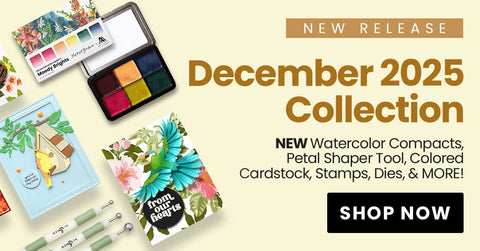





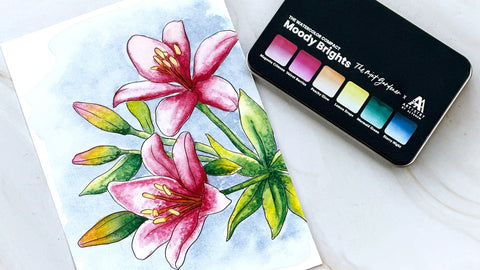
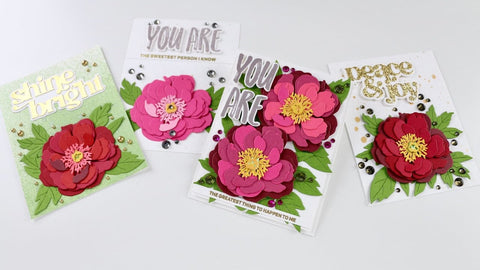
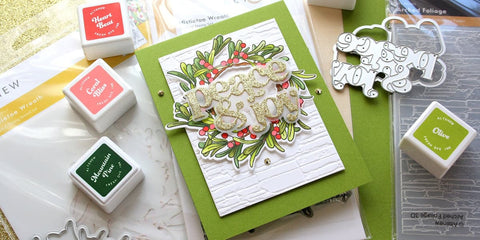
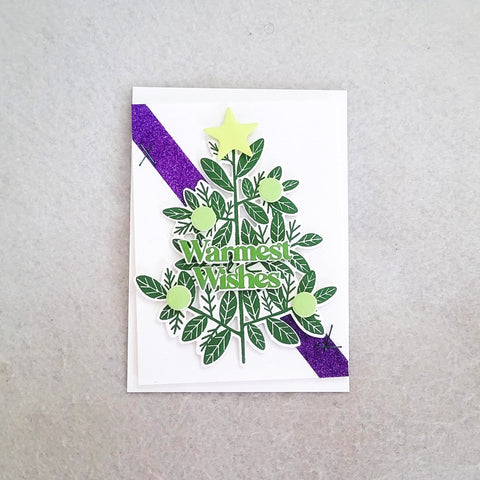



What a very useful and interesting post. Thank you. I love watercolour pencils as I am hopeless at colouring.
I had not heard of frottage and am definitely going to try it.
Thank you again for all the info…… BTW. Great card
Stunning card! Great inspiration for trying Watercoloring. Blessings ❤️ 🙏🙏